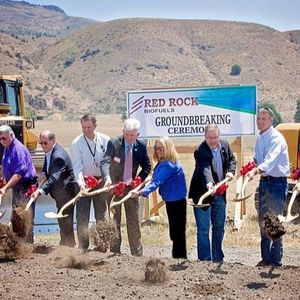EFT licenses its Fischer-Tropsch technology to Red Rock Biofuels

Photo: Red Rock Biofuels LLC
October 23, 2018
BY Emerging Fuels Technology Inc.
Emerging Fuels Technology Inc. has executed a license agreement with Red Rock Biofuels LLC under which EFT will provide its TL8a Fischer-Tropsch technology to provide additional FT capacity for RRB’s biorefinery in Lakeview, Oregon. EFT has also received a “notice to proceed” from RRB to commence design of its FT system to be installed at the Lakeview biorefinery.
RRB is a subsidiary of IR1 Group LLC, which has built and operated more than 325 million gallons of biofuels production capacity and is constructing the Lakeview biorefinery.
Advertisement
Advertisement
IR1 plans to build a global portfolio of biorefineries to convert waste woody biomass into renewable jet and diesel fuels. Through a proprietary integration of existing technologies, IR1 makes the long-commercialized Fischer-Tropsch process economic at the biomass scale. By using forest and sawmill residues, IR1 will also reduce the risk of catastrophic wildfires by removing waste biomass from overstocked forests.
“We are looking forward to working with Red Rock Biofuels on this project,” said Kenneth Agee, president of EFT said. “This represents the third commercial license EFT has sold and the first license of our second-generation TL8a catalyst-reactor system, which requires half as much catalyst volume for the same output capacity as our first-generation TL8 catalyst. This means the reactor size is also cut in half for the same capacity. We expect the TL8a system will be a major portion of our licensing activity in the foreseeable future.”
Advertisement
Advertisement
Terry Kulesa, CEO of IR1 and RRB, said, “We are pleased to be working with EFT on their TL8a catalyst-reactor system, which will provide additional FT capacity for our Lakeview biorefinery.”
EFT is a technology company focused on methods for producing synthetic fuels and specialty products from a variety of feedstocks such as natural gas, biomass, municipal solid waste and bioderived oils. EFT is an authority on Fischer-Tropsch (FT) and related synthesis, licensing the core technologies and upgrade packages for applications ranging from 500 to 10,000 barrel per day.
IR1 Group is currently constructing the Red Rock Biofuels LLC biorefinery in Lakeview, Oregon, which will convert approximately 136,000 dry tons of wood waste biomass into more than 15 million gallons of renewable jet, diesel and gasoline blendstock fuels.
Related Stories
Bangkok Airways Public Company Limited has officially announced the adoption of sustainable aviation fuel (SAF) on its commercial flights, reinforcing Thailand’s green aviation industry. The initiative took effect starting July 1, 2025.
Avalon Energy Group LLC and Sulzer Chemtech have signed a strategic alliance and partnership agreement to scale up the production of SAF. Under the agreement, Avalon has selected BioFlux technology for its portfolio of SAF projects.
Neste and DHL Express have strengthened their collaboration with the supply of 7,400 tons (9.5 million liters) of neat, i.e. unblended, Neste MY Sustainable Aviation Fuel to DHL Express at Singapore Changi Airport starting July 2025.
CoBank’s latest quarterly research report, released July 10, highlights current uncertainty around the implementation of three biofuel policies, RFS RVOs, small refinery exemptions (SREs) and the 45Z clean fuels production tax credit.
The U.S. Energy Information Administration maintained its forecast for 2025 and 2026 biodiesel, renewable diesel and sustainable aviation fuel (SAF) production in its latest Short-Term Energy Outlook, released July 8.
Upcoming Events










